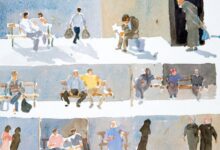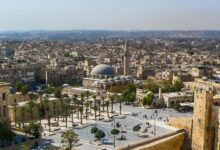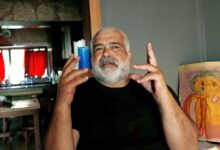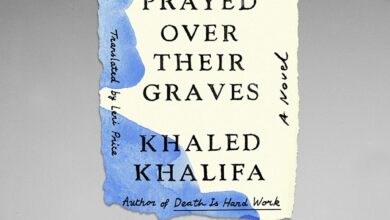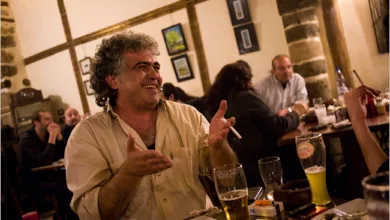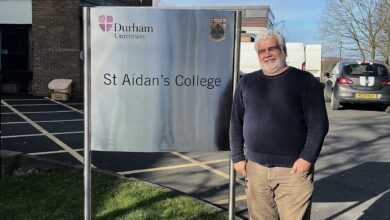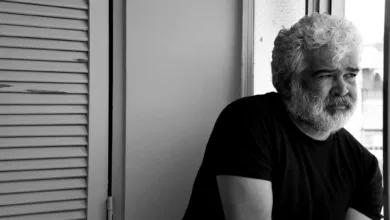In the second of six interviews with the nominees for the 2014 International Prize for Arabic Fiction, Asharq Al-Awsat speaks with Syrian novelist Khaled Khalifa about his fourth novel—and second nomination—and the political situation in Syria today

London, Asharq Al-Awsat—Novelist and screenwriter Khaled Khalifa is one of the few Syrian writers who can be said to have truly broken the wall of silence. His oeuvre breaks down deep-seated taboos in Syrian and Arab societies. Khalifa came to the limelight with the publication of his third novel, In Praise of Hatred (2006), which deals with the off-limits subject of political and religious oppression in Syria. It has since been translated into several languages.
Today, Khalifa continues his success with his fourth novel, No Knives in this City’s Kitchens (2013), his second novel to be shortlisted for the International Prize for Arabic Fiction (IPAF) after In Praise of Hatred. Also awarded the Naguib Mahfouz Medal for Literature (2013), No Knives is a truly literary work that traces the tragic lives of a Syrian family from Aleppo—Khalifa’s hometown—to Paris via Baghdad and Dubai. The novel covers a critical period of Syrian history from the early 1960s to 2005.
Asharq Al-Awsat spoke with Khalifa about his passion for his home city of Aleppo, his view of the more than three-year-old Syrian crisis, and the duty of writers.
Asharq Al-Awsat: The narrator in No Knives in this City’s Kitchens says: “Aleppo is as transient as oblivion. All that will remain of its main image is a lie we reinvent every day in order not to die.” Why did you choose Aleppo as the setting of your last novel, given that you spent a large part of your life in Damascus?
Khaled Khalifa: I have spent half of my life in Aleppo and the other half in Damascus. But Aleppo has not ceased to be my favourite place to write about. I do not know the secret, or perhaps I cannot explain it, particularly since I can still write about it again and again. I do not know when I will write about Damascus; but perhaps I will never do that and remain the prisoner of Aleppo.
Q: The novel covers the period between 1963 and 2005. Why did you choose to write specifically about this period in the history of Syria? To what extent did those years help shape the Syrian people’s consciousness?
These years have shaped the Syria our generation lives in. During this period, the dreams of Syrians to a large extent changed from being a desire to build a modern, democratic country open to all local and international cultures to [having instead] a closed and oppressed one, governed by the one-party culture and its sycophantic ideology.
Q: In her journey of self-discovery, one of the book’s characters, Sawsan, fluctuates between a sexually promiscuous lifestyle and one of religious fundamentalism marked by sexual repression. We notice the same about her brother, Rashid, the musician who “replaced Aleppo’s ancient Qudood with [Islamic] Mawlid recitals.” Tell us about these fluctuations.
In general, I do not interfere very much with the fates of my characters after a certain point in the writing process, nor can I explain them. I believe [my characters] can always justify their actions. However, I think human beings in all their manifestations can still surprise us with their complex changes, and the role of the novel is to pick these always-tragic changes. In other words, these changes—excavating the human self—is the novel genre’s favorite theme.
Q: The character of Comrade Fawaz, who masters the art of cheering and “glorifying the leader,” is an interesting character who represents a considerable segment of society in Syria. Why did you marginalize this character?
I did not marginalize him. The character did his job and then exited the scene. There is no need to revive a character who wants to stop developing and growing. The character of Fawaz is stereotypical, and the fact that there are many who resemble him does not mean he is important or deserves a larger space. In general, I do not like to write about communal characters. Instead, I love working on unique characters who are able to live and develop. Such characters are closer to human beings in their secret and mysterious manifestations.
Q: Four of the novel’s five chapters open with the death of the mother, who used to “complain about the lack of oxygen.” Despite being at the margins of the storyline, the character of the mother forms the background of the novel. Why did you choose this character in particular?
I don’t know, in fact, and I still wonder if I made a good choice or overlooked better options to tell the story of this family, city and country.
Q: Your narrative style is distinguished by its flowing smoothness and lyricism that adds a touch of beauty to the tragic reality. Isn’t this strange for a novel that deals with the shame of Syria?
I do not find that strange. Language, for me, is part of my project as a novelist. I do not think there is a different language for each act, in the sense that one should use a sterile or unpoetic language when talking about shame. I am still fond of playing with language.
Q: Usually writers wait some time before they write about major and influential incidents for fear of running the risk of being dogmatic at the expense of the dramatic element. To what extent did this question preoccupy you while writing No Knives?
I believe I have waited long enough to write about Syrian life under one-party rule. In addition, the Syrian people have waited for too long to express their thoughts and say they are not happy and [that they] dream of change and justice.
Q: No Knives deals with the problematic relationship between the countryside and the city. To what extent has the current situation in Syria helped bridge the gap between the two?
The gap between the countryside and the city has never been the main problem. However, over the past decades the [Syrian] regime has sought to destroy the city as a concept and a lifestyle. Here there are no cinemas, theatres, museums or newspapers. What is left of the city after all of that?
Q: Since the publication of In Praise of Hatred in 2006, your name has been associated with the breaking down of deep-seated political and religious taboos. What has the Syrian authorities’ response been like, particularly as you are still based in Damascus? Are your books available in Syria?
It is the duty of writing to help break down taboos and clash with fixed and backward concepts. Therefore, I only did my duty as a writer. As for the authorities’ response, they did not care—they only banned my books and sometimes banned me from traveling. But I do not care about all these issues.
Q: As a Syrian living in Syria, what is your assessment of the political situation there?
The political scene in Syria is extremely bad. And a political solution must be found before the country goes into a long war that will leave nothing intact in Syria. All sides will lose in this war. But unfortunately, decision-making is no longer in the hands of the Syrian people and this is how the majority of Syrians who have patiently insisted on remaining in Syria feel.
Q: What does it mean to you that your fourth novel has made it onto the IPAF shortlist? Did you expect that?
I hoped—but did not expect—it would make it onto the shortlist. I voluntarily competed for this prize. At the end of the day, it is good news for me, my friends and the Syrian novel.
This interview was originally conducted in Arabic.
Published on Asharq Al-awsar here

